Fakir Lalon Shah: A Lighthouse in the Unreal Bazaar of the Blind
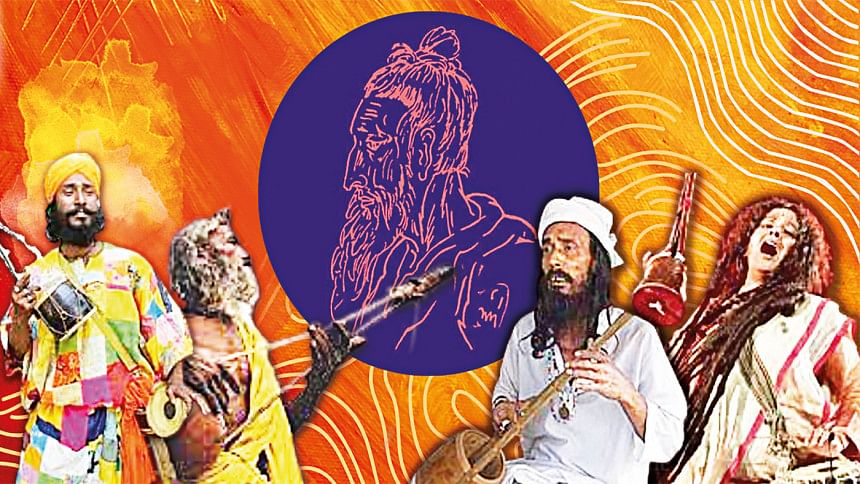
He spoke of women on equal terms at a time when women were not even people in the country where he lived (and they still are not—neither in the land of Lalon nor in the world that we proudly claim as ours. The world still belongs to men and will be so until they destroy it with their 'manly' hands. This however is a separate issue, which is why I have kept it in the veil of parenthesis here). Lalon not only avowed respect for women but also took his ideas beyond gender binaries. And the most unreal thing about him is that he valued human existence more than he valued religion specific rituals and conducts, and was inclined to find the God/Good in every human soul. He could neither read nor write, and yet he was the one who knew. I find it simply impossible for this man to be a part of a reality that fed on willful blindness and discrimination of all sorts. And yet, there he was, a centenarian, standing stout against all odds, in defiance of all the androcentric and egotistic superficialities of religions and social customs, singing his songs of the soul.
There was not one but at least three popular stories regarding Lalon's birth and early age. According to one story, he was a Hindu youth, who fell ill with small pox during a pilgrimage and was left "dead" by the roadside. The 'dead' man was brought back to life by a Muslim family, who nursed him back to health. Upon returning home, Lalon found out that his family had already performed his funeral by completing his 'sraddha,' the dispatch ceremony for his departed soul. The dead man Lalon's death sentence doubled up since his second life was given to him by Muslims. The outcast youth left home and established an 'akhra' in a nearby place, where he lived the life of a baul, surrounded by his disciples.
Lalon was not real. A man who had more than three birthing stories and was reborn more than once can't be real. He was either Hindu or Muslim, or both—or neither. Nobody knew who he was, where he was from, or how old he was. The average life expectancy from 12th to 19th century was fifty five, but this unreal man is believed to have lived an impossibly long life—covering the life span of two people. He was rumored to have either walked on his 100 years old feeble feet to visit the dashing zamindar Tagore (who was in his early thirties), or sat still for God knows how long for the other Tagore brother to draw a sketch of him.
In another story, the orphan Lalon was adopted by a man named Siraj Sain, who became his guru in the matters of music and spiritual lesson. The third story puts him in Nabadwip of West Bengal, where a youth named Lalon became a foster son of a Kayastha woman named Padmabati. In all the stories, he was depicted as a youth with charismatic personality, with the power to win the hearts of anyone who came to know him. This man of many births lived his life in search of the eternal truth and died his final death while singing his songs of devotion. According to one description (noted by Mobarak Hossain Khan in his Lalon Shamagra, published by the Bangla Academy in 2007), he spent his last day on earth singing all night long with his disciples, and breathed his last at around eight in the morning. His last words to his disciples were, "I'm going now." But he was never gone—this unreal man. More than a hundred years after his death, we are still mesmerized by the magnanimity of his humanistic philosophy. He dreamt of a society where there would be no division and difference among people. "When will such a society be created/ In which there will be no difference /Between Hindus, Muslims, Buddhists Christians, or race and caste?" Lalon ended the song the following way:
"No one will chant for
Religion, race, class, or caste
Lalon Fakir asks in earnest,
'Who will show me such a day?'" (author's translation)
Lalon did not let his identity get branded by any religious or sectarian tropes. He rejected everything that binds and accepted everything that frees the human spirit. He assimilated in his songs the core ideas from the Vedic, Upanishadic, Vaishnavite, Buddhist, Tantric, and the Islamic Sufi philosophy. In hundreds of songs, he dealt with the issues of religion, gender, class, caste, nature, the ontology of human body and spirit, along with the origin of God and/or the Supreme Soul. A man of no knowledge, he became the lighthouse of wisdom, singing for unity, equality, respect, and peaceful coexistence. Even though he was influenced by the spiritual message, the tantric practices, and the stylistic structure of the Charjapadas, Lalon refused the overtly sexualized symbolism of the female body of the Tantric tradition. His was a somewhat pangender view in which he glorified the woman as an individual and as an inherent pair of a man's inner self. In many of his songs, he dealt with the image of the devotee as a feminine form of the [masculine] self. Take for example the song in which he sings, "will the guru let me stay by his foot as a maid?" or the one where the devotee regrets for not having the chance to serve his guru as his maid:
"The yearnings of my heart
My hopes were not fulfilled
I wanted to sit by his feet
And serve him as his maid
Impeding it, my Fate made me suffer in the world." (author's translation)
Lalon is always a thing of mystery to me. An enigma. Or maybe a priori to the mystery of all mysteries that we claim as ours for being humans—as Ashraful Mokhlukat—the best of all creations, and yet so low. A critique of sectarian convention, Lalon challenged the notion of social superiority in many of his songs. In one song, he sang, "Everyone asks, what is Lalon's caste?
'I've not seen what caste looks like,' Lalon says" (author's translation). In another one, he made fun of those who freak out fearing contamination of race and caste. However, my most favorite is the one where he denounced the world as a marketplace of the blind:
"This is the bazaar of the blind
Blind are the vedas and the doctrines
Blind also is my mind." (author's translation)
It is not only the fear of losing caste. It is the fear of losing blindness. It is the fear of light that haunts the blind. Those that are not afraid of light are not real; they can't be, because in this world and time, we are only awakened by death and darkness. We have lost our desire to see each other as equal humans; we fancy ourselves to be the judge of humankind because we are better than others, or because we are men or belong to those that are men. We read the invisibility of God as our sight/site of power and strength, and we use that power to oppress women, nature, and the marginalized people of all genders, races, and ethnicities. In our dying world, we are in need of some light. We are in need of a centenarian singer of the soul named Lalon.
Author, academic, and translator, Fayeza Hasanat teaches at the University of Central Florida, USA and occasionally writes for the Star Literature page.

 For all latest news, follow The Daily Star's Google News channel.
For all latest news, follow The Daily Star's Google News channel. 

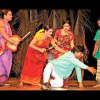
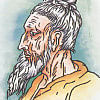
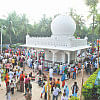

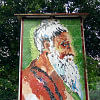


Comments